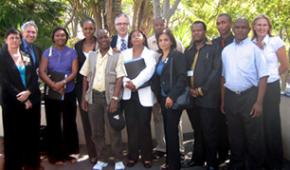
While South Africa is one of the most prosperous African countries, it also faces high crime rates. In response, the government has embarked on an ambitious, country-wide community justice program. Seventeen (soon to be 18) community courts are currently in operation around the country. Community policing strategies are being employed throughout the national police force. And, in 2006, the National Prosecuting Authority launched a community prosecution pilot program in each of the country’s nine provinces, in areas that together account for some of the highest crime levels in South Africa.
The nine sites were selected for their high crime rates or persistent levels of minor crime, as well as for their potential for social and economic development. If the model works at these diverse sites—two urban, six peri-urban (township), and one rural—it will work nearly anywhere in the country, justice officials believe. The approach is targeted and aggressive: prosecutors have been sent into each community to begin working on reducing and preventing local crime at the community level, and each site is being rigorously evaluated through data collection, questionnaires, workshop discussions, site observations, photographic documentation, and formal and informal interviews.
“This is a very exciting initiative as we explore the role of the prosecutor in crime prevention and community justice,” says Shamila Batohi, Director of Public Prosecutions for KwaZulu-Natal province and the senior prosecutor responsible for coordinating the project. “We face enormous challenges in our beautiful country, but we are optimistic that the community prosecution initiative will help us move closer to the achievement of the National Prosecuting Authority’s vision: ‘Justice in our society so that people can live in freedom and security.’”
According to researcher Richard Griggs of Independent Projects Trust, successes to date have been palpable. In Windsor East, for example—an urban area troubled by drug sales, organized crime, and transient populations—a joint operation between the community prosecutor and local police resulted in the arrests of 15 drug syndicate members. A number of illegal immigrants, whose presence in the community had led to a noticeable increase in criminal activity, have been arrested and deported. The arrests of dozens of other offenders have helped clean up Windsor: drug dealers who were previously visible have retreated from the streets, and it is no longer common for landlords to rent to illegal immigrants or for businesses to hire them. Community prosecution efforts have helped drive brothels out of the area, while negotiations with businesses and community members have brought the crime-ridden King’s Pub area, notorious for drug activity and wild behavior, under control.
In another, very different example, community prosecutors have had some early success in the rural North West Kudumani, where cattle theft had been a significant problem. A major clamp-down on rustling in 2006 led to a significant reduction in cattle theft, which is now negligible in the area (previously up to 40 cases had been reported per day ). The community is no longer engaged in vigilantism, and proper facilities—including fenced grazing camps, branding, and veterinary services, all of which prevent cattle theft—are being developed. With the arrest of police members who were participating in livestock theft, police-community relations have improved.
The community prosecution project is still being piloted and monitored. Any early findings discussed here are tentative observations pending the full evaluation that will be undertaken from mid-June 2007 and released by September.
Due to these initial successes and the government’s commitment to reducing crime, justice officials are spreading the lessons learned from community prosecution. In February 2007, a two-day National Prosecuting Authority conference on Community Prosecution and Restorative Justice was held in Cape Town, with the audience consisting of the 250 most senior prosecutors in the country (with a spotlight on the nine community prosecutors).
As results are gathered from around the country, researchers are examining a number of key questions, including what kind of models might fit any given location, and how community prosecution as it exists in South Africa, with its unique history and problems, can be defined in the present and shaped for the future.
UPDATE: In March 2008, an extensive independent research report on the South African pilot sites was released. The report found that partnerships between community prosecutors, municipalities, local communities and police can significantly help reduce crime rates. To read more, click here.

